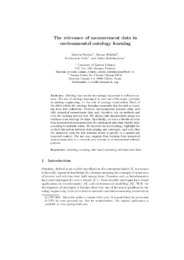The Relevance of Measurement Data in Environmental Ontology Learning

Files
Self archived version
final draftDate
2011Author(s)
Unique identifier
10.1007/978-3-642-22285-6_48Metadata
Show full item recordMore information
Self-archived item
Citation
Stocker, Markus. Rönkkö, Mauno. Villa, Ferdinando. Kolehmainen, Mikko. (2011). The Relevance of Measurement Data in Environmental Ontology Learning. Environmental Software Systems. Frameworks of eEnvironment, 445-453. 10.1007/978-3-642-22285-6_48.Rights
Abstract
Ontology has become increasingly important to software systems. The aim of ontology learning is to ease one of the major problems in ontology engineering, i.e. the cost of ontology construction. Much of the effort within the ontology learning community has focused on learning from text collections. However, environmental domains often deal with numerical measurement data and, therefore, rely on methods and tools for learning beyond text. We discuss this characteristic using two relations of an ontology for lakes. Specifically, we learn a threshold value from numerical measurement data for ontological rules that classify lakes according to nutrient status. We describe our methodology, highlight the cyclical interaction between data mining and ontologies, and note that the numerical value for lake nutrient status is specific to a spatial and temporal context. The use case suggests that learning from numerical measurement data is a research area relevant to environmental software systems.


